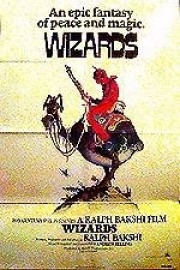Wizards
Where have the Ralph Bakshi’s of the world gone? In modern cinema, it appears that all that remains of animation in cinema are “brands”– Pixar, Disney, Dreamworks, Blue Sky, Nickelodeon, Studio Ghibli –and individual talents in animation are no more. Of course, that’s far from true, as the independent world, and world cinema as a whole, has several artists and animators working outside of the conventional notions of animation in film. I had the pleasure of going to a Q&A with Bakshi a couple of years ago at Dragon*Con, and it was definitely a good catalyst to inspire me to get into his films, not to mention making me lament about the lack of Bakshi’s in American film.
One of the first films I was immediately inspired to watch of Bakshi’s was his 1977 fantasy, “Wizards,” and, if you’ll pardon the pun, I found myself under its spell. Previously, I had only seen Bakshi’s “American Pop” (seen many years ago), “The Lord of the Rings,” and “Fritz the Cat,” but without a doubt, “Wizards” is my favorite of his. Though the film’s screenplay borrows from various fantasy tales of old (and one can see a definite bee-line between “Wizards” and Tolkien’s world), it feels wholly original, and just as vital and entertaining as it must have been back in ’77.
The film is set in a post-apocalyptic world, after nuclear holocaust has decimated Earth. Only a relatively few humans have survived; the rest have become mutants. The world of “Wizards” is broken up into two lands: Montagar, which is an idyllic land where the “true ancestors” of humans (fairies, elves, and dwarves) returned to, and live in peace; and Scortch, a nuclear wasteland where mutants live, and technology reins supreme. These lands come to be ruled by two brothers, born of Delia, the Queen of the Fairies: Avatar, a magic user who follows his mother’s love for peace, rules Montagar; and Blackwolf, a deformed mutant who cares only for power, rules Scortch. Long ago, Blackwolf tried to defeat his brother, but Avatar fended him off, primarily because Blackwolf’s army of mutants lacked focus and conviction. However, now Blackwolf has unearthed a secret weapon that will increase the resolve of his army, and taps into the fear of the good people of Montagar. Can Avatar fight back against this new villainy?
There’s a lot of indicators of how crazy a time the ’70s were in cinema in “Wizards,” but I don’t think there’s any bigger one than the fact that this movie, which features buxom fairies and scenes of harsh brutality (both in animated and live-action form), received a PG rating. (Of course, the PG-13 rating was still several years off, but it’s hard to imagine this movie having the same rating as “Star Wars” and “E.T.”) Bakshi’s approach as an animator, which includes hand-drawn characters and live-action elements, the latter most notably done through rotoscoping (which is painting over live-action elements, a la “Waking Life”), is hallucinatory, and this style serves the fantasy genre well. It’s like someone expanded the “Pastoral” and “Night on Bald Mountain” segments of “Fantasia,” combined the narratives, dropped acid while doing so; trust me, that’s meant as a compliment. Bakshi has a wicked vision that no one else can touch, and “Wizards”– which was a cult hit at the time, and has grown in stature since –was just the first of his dealings with fantasy, and, I would suspect, led directly into him getting to make “The Lord of the Rings” for producer Saul Zaentz next.
Bakshi is a natural filmmaker when it comes to fantasy. (Any way we can get him to do a “Dungeons & Dragons” movie, which I know Hollywood wants to make, to make up for that 2000 abomination?) However, it’s fascinating how one of the strongest emotional beats he creates in “Wizards” is the result of things we’re familiar with in the modern world. The “secret weapon” that Blackwolf uses against the armies of Montagar is actually a movie projector, and reels of Hitler and the Third Reich during World War II. Blackwolf adapts the projector and, using his magical powers, projects the images across the battlefield where the two armies meet, inspiring resolve in his troops while bringing out the fear in his enemies, turning the tide of the war. Of course, the rise of Hitler, and his march on Europe during WWII, is a perfect parallel to Blackwolf’s own desires in “Wizards,” but by making that parallel as explicit as it is here would, at first, seem like a mistake, but actually works in the film’s favor, because we understand, as an audience, what Hitler stood for, and understand why it must be fought back at all costs, putting us firmly on the side of Avatar and his followers. The level of confidence Bakshi has in this approach to the story is evident in every frame, as is the delicious sense of justice he gets from how Avatar kills Blackwolf in the end, lifting “Wizards” into the upper realms of not just fantasy filmmaking, but personal storytelling as well. It’s a surreal, visually alive, wonder that any serious fan of genre filmmaking should see.










